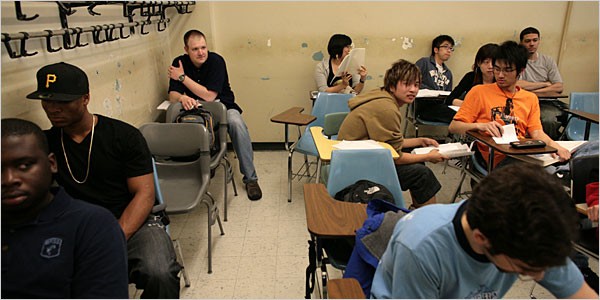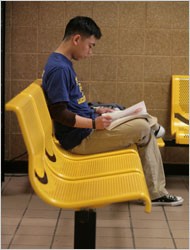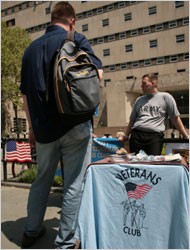bnz506
TPF Noob!
(Long) Excellent story but I might be a little bias if you have time to read.
COMING HOME
By MICHAEL WEINREB
Published: May 20, 2007
Photos: Fred R. Conrad/The New York Times

Patrick ONeil, student and former soldier, sitting in the back.
PATRICK ONEIL, tall and broad-shouldered, towers over many of his classmates at the New York City College of Technology in Downtown Brooklyn, and at age 31 he is older than many of them. But there is also a less apparent gulf between Mr. ONeil and his fellow students.
I watch these people moving through their lives, and its so odd, he said one afternoon a few weeks ago in a vaguely industrial-looking lounge in Namm Hall as other students studied, stared vacantly out the windows or rushed past on their way elsewhere. After I got back, I had an epiphany: If you think the next week you could go on a convoy and get blown to bits, the right now is more valuable. I realized there were no guarantees.
Mr. ONeil is a veteran. He is one of about 200 former servicemen and servicewomen who are enrolled this semester at City Tech, a college with more than 28,000 students that is housed largely in a labyrinth of interconnected buildings amid the courthouses and office buildings of Downtown Brooklyn.
The contingent of veterans at City Tech is not small, and it is likely to grow, as is the veterans presence at the 22 other institutions of the sprawling CityUniversity system. As war in the Middle East continues and American troops rotate into and out of Iraq and Afghanistan, greater numbers of veterans are returning to the city. CUNYs affordability tuition is $4,000 a year at City Tech, for example appeals to many of them.
Perhaps most important, CUNY officials, who oversee about 450,000 students, are actively seeking to make their schools more attractive to former soldiers. Among other things, they are appointing a specialist in veterans issues on every campus, setting up a Web site on veterans affairs, lobbying the State Legislature for more money for veterans services, and allowing veterans to take classes before they receive their federal tuition money.
The bottom line is that the CUNY system, which now has about 2,500 veterans enrolled, hopes to have many more. Were expecting an influx of new veterans in the next two years, said Garrie Moore, the CUNY vice chancellor for student development. We know the need is there.
For people like Mr. ONeil, going back to school after military service offers many of the hallmarks of college, from its intellectual demands to its social opportunities to the career aspirations it nurtures. But in many respects, the veterans are not typical students. They are set apart not just by age and experience, but also by the challenge of re-entering civilian society and by the fact that they stand in the crosshairs of the widespread antipathy toward the Iraq war, a dislike that is especially strong in a liberal city like New York.
Im starting to realize more and more how odd it is to adjust, said Mr. ONeil, who dresses like other students but whose dark hair is shorter than most. There are a lot of subtle things in your life that shift.
Does he feel like an outsider? I guess you could say that, he replied.
Uneasy Naps
In the traditionally liberal climate of a college campus, Philip Chiu, a soft-spoken former infantryman who is in his third semester at City Tech, is taking a bit of a risk in saying that he liked being in Iraq.
Mr. Chiu, a slight and introspective man who loves photography, also knows that it is difficult to explain this feeling to those who have not experienced what he did, who cannot comprehend how the rush of adrenaline somehow serves to remind a human being that he is alive.
But fellow veterans understand. Strangely, said Mr. ONeil, I can see what hes saying.
The craving for adrenaline is not the only distinction between veterans and other collegians. So is a very different desire sleep. It is not that veterans dont enjoy the collegiate habit of sleeping in; Mr. Chiu sleeps in whenever he gets a chance. But he does so almost to make up for all those years when uninterrupted rest was at a premium. And even as he slumbers like countless other college students, he says, he feels strange, as if the world around him had shifted into a slower gear.
I can do whatever I want, and no one will bother me, Mr. Chiu said. College has been easy so far. But I still miss the military.
In countless ways, the return to civilian life can be hard. I think things were not as difficult for Vietnam veterans as they are today, said Dr. Moore, the CUNY vice chancellor, himself a Vietnam veteran. Vets now have a lot of pressures on them. Things are more expensive. Theyve got to find health care. Theyve got to find child care. A major difficulty is access to information and access to resources to help them get into educational institutions.
The veterans go-to person at City Tech is John Byrnes, an Iraq veteran and a graduate of CUNYs Hunter College. He works with a full-time student counselor, Paul Schwartz, and an assistant registrar, Monique Blake, who estimates that she spends nearly half her time handling veterans paperwork and logistical questions. The three handle the normal college issues, such as getting credits transferred, but they also frequently encounter matters particular to former soldiers, from post-traumatic stress disorder to the demands of juggling jobs, work and children.
One of the biggest topics is getting what theyre owed under the G.I. Bill, which pays CUNYs tuition in full for nearly all veterans. Most of them come into my office asking, Wheres my money? Ms. Blake said.
When Mr. Byrnes returned home in 2005, not long after witnessing the death of Specialist Segun Frederick Akintade, the lone City Tech student killed in Iraq, he confronted a variety of bureaucratic obstacles to completing his own college classes. But he says that more recent returning veterans have an easier time. Now, theres enough of a focus in the media on veterans that were making progress, Mr. Byrnes said.
No Welcome Mat
Still, the most difficult adjustment for returning veterans, accepting the notion that their lives are now their own, is a chore they must face essentially alone.
Youre treated like babies in the military, said Binod Gurung, a 27-year-old son of Nepalese immigrants who was stationed on the U.S.S. Bonhomme Richard in the Persian Gulf in 2004. Now, you have to build up your own discipline.(to read rest of story: http://www.nytimes.com/2007/05/20/nyregion/thecity/20vet.html?ref=thecity )
1)2) 3)
3)

1) Mr. ONeil did two stints in Iraq
2) Philip Chiu, with a 3.69 GPA, may pursue medicine.
3) City Tech seeks ways to support its student veterans.

![[No title]](/data/xfmg/thumbnail/34/34139-e52deba745f42ba091907fcc460cd6db.jpg?1734164696)









![[No title]](/data/xfmg/thumbnail/34/34137-37e6e29a844c1214e5b14ce322c7b716.jpg?1734164686)
![[No title]](/data/xfmg/thumbnail/36/36133-8b29212f67c25fcf353a0c2f376b1501.jpg?1734168234)